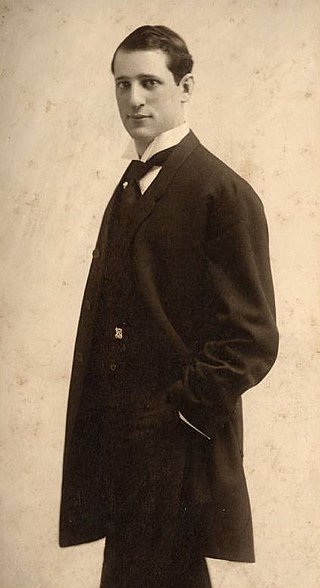See also
- Tin Pan Alley, a collection of music publishers and songwriters in New York City
Tin Can Alley may refer to:

Andy Razaf was an American poet, composer, and lyricist of such well-known songs as "Ain't Misbehavin'" and "Honeysuckle Rose".

Albert Von Tilzer was an American songwriter, the younger brother of fellow songwriter Harry Von Tilzer. He wrote the music to many hit songs, including, most notably, "Take Me Out to the Ball Game".

George Gard "Buddy" DeSylva was an American songwriter, film producer and record executive. He wrote or co-wrote many popular songs, and along with Johnny Mercer and Glenn Wallichs, he co-founded Capitol Records.

Tin Pan Alley was a collection of music publishers and songwriters in New York City that dominated the popular music of the United States in the late 19th and early 20th centuries. Originally, it referred to a specific location on West 28th Street, between Fifth and Sixth Avenues in the Flower District of Manhattan, as commemorated by a plaque on 28th Street between Broadway and Sixth. Several buildings on Tin Pan Alley are protected as New York City designated landmarks, and the section of 28th Street from Fifth to Sixth Avenue is also officially co-named Tin Pan Alley.

A refrain is the line or lines that are repeated in music or in poetry — the "chorus" of a song. Poetic fixed forms that feature refrains include the villanelle, the virelay, and the sestina.

Kirstie Louise Alley was an American actress. Her breakthrough role was as Rebecca Howe in the NBC sitcom Cheers (1987–1993), for which she received an Emmy Award and a Golden Globe in 1991. From 1997 to 2000, Alley starred as the lead in the sitcom Veronica's Closet, earning additional Emmy and Golden Globe nominations. On film, she played Mollie Jensen in Look Who's Talking (1989) and its two sequels, Look Who's Talking Too (1990) and Look Who's Talking Now (1993).

A marble is a small spherical object often made from glass, clay, steel, plastic, or agate. They vary in size, and most commonly are about 13 mm in diameter. These toys can be used for a variety of games called marbles, as well being placed in marble runs or races, or created as a form of art. They are often collected, both for nostalgia and for their aesthetic colors.

Hogan's Alley is a light gun shooter video game developed and published by Nintendo. It was released for the Family Computer in 1984 and then the arcade Nintendo VS. System and Nintendo Entertainment System in 1985. It was one of the first hit video games to use a light gun as an input device, along with Nintendo's Duck Hunt (1984). The game presents players with "cardboard cut-outs" of gangsters and innocent civilians. The player must shoot the gangs and spare the innocent people. It was a major arcade hit in the United States and Europe.

The 32-bar form, also known as the AABA song form, American popular song form and the ballad form, is a song structure commonly found in Tin Pan Alley songs and other American popular music, especially in the first half of the 20th century.
Verse–chorus form is a musical form going back to the 1840s, in such songs as "Oh! Susanna", "The Daring Young Man on the Flying Trapeze", and many others. It became passé in the early 1900s, with advent of the AABA form in the Tin Pan Alley days. It became commonly used in blues and rock and roll in the 1950s, and predominant in rock music since the 1960s. In contrast to 32-bar form, which is focused on the refrain, in verse–chorus form the chorus is highlighted.
Tintin usually refers to:
Tin Can Alley is an inexpensive electronic shooting game for children. It uses infrared technology embedded inside a small plastic pistol or rifle. The objective is to aim at a mark below a selection of small tin cans perched upon a plastic wall. Successfully aiming at the marks below each of the cans causes the can to "pop off".
Harry MacGregor Woods was a Tin Pan Alley songwriter and pianist, he was a composer of numerous film scores.

The It's My Life Tour was a concert tour by the Anglo-American hard rock band Tin Machine. The tour commenced on 5 October 1991 after two warm-up shows, one press show and three trade-industry shows, visiting twelve countries and concluding after seven months and sixty-nine performances, a larger outing than their first tour in 1989.

"After the Ball" is a popular song written in 1891 by Charles K. Harris. The song is a classic waltz in 3/4 time. In the song, an uncle tells his niece why he has never married. He saw his sweetheart kissing another man at a ball, and he refused to listen to her explanation. Many years later, after the woman had died, he discovered that the man was her brother.
"Take Me Out to the Ball Game" is a Tin Pan Alley song that became the unofficial anthem of baseball.

Tin Alley are an Australian rock band from Melbourne formed in 2007 by brothers Paul and Jim Siourthas, and Peter Hofbauer.
Peter or Pete Rose may refer to:
Tin Can Alley was an unincorporated community in Harlan County, Kentucky, United States.
Tin can may refer to: